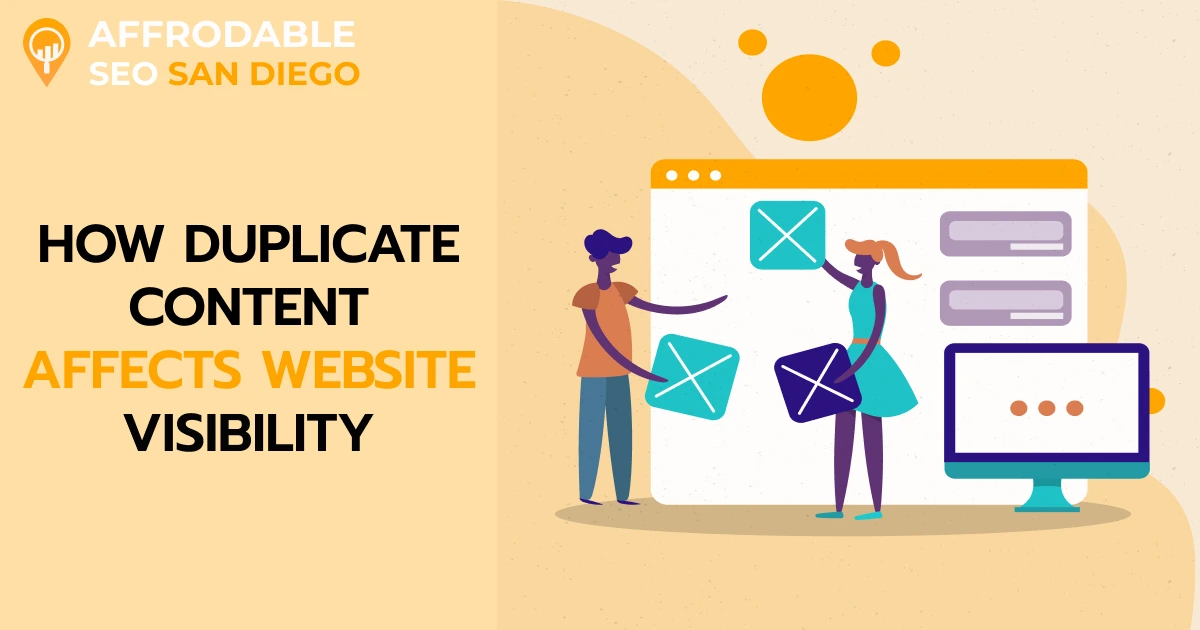Is repeated info on a website bad for SEO?
Digital content marketers often face the critical question: Is repeat info on a website bad for ranking? This question arises because of misunderstandings about how Google interprets duplication. Repetitive structure on a website may seem harmless or efficient while building a site skeleton, but for me, having excessive repetition can be harmful. It can confuse the algorithm, leading to penalties that can hurt your SEO campaign and website visibility because it is a fundamental of SEO strategies to ensure that your content is unique and aligned with the top factors of SEO. From my experience, understanding how duplicate content impacts ranking is key to avoiding being penalized and maintaining strong results.

👉 Need SEO service? Contact us now and get 30% off.
What Is Duplicate Content
When content on your website is repeated in multiple locations with similar substantial blocks, Google treats them as a copy. For example, having similar content on different pages confuses search engines and leads to de-ranking factors, even if locations serve different factors. Since each URL is seen as unique, search engines fail to prioritize which version to show. Sharing an exclusive article across multiple pages might seem helpful, but Google considers it harmful. To ensure the ranking and visibility of your website, ensure each URL shows unique value.
How Duplicate Content Affects Website Visibility
Duplicate content creates multiple SEO challenges that can significantly hurt website visibility on SERP.
Let us explore those challenges from my personal experience.
👉 PS. Check out Google's official post about duplicate content.
Poor User Experience:
One of the major problems you might face due to content duplication is poor user experience. Whenever users see the same content on different pages, they might get bored and leave. The bounce rate is considered a key factor, and a high rate can prevent your website from getting enough visitors.
Self Competition:
This repetition can also lead to self-competition. Website pages will eventually compete against each other, allowing your competitors to grow in the space you created.
Penalties:
Google considers duplicate content a violation of its guidelines, which can result in penalties for your site and, most likely, a loss of your position on SERPs.
Risk Of Duplicate Content:
Some website owners intentionally repeat content, relying on strategies like creating duplicate pages with multiple backlinks to manipulate crawlers and increase visibility. This is a foolish act because search engines are smart enough to detect such tactics. Instead of gaining visibility, you will lose your visitors.
How Much Duplicate Content is Acceptable?
I’ve already mentioned the consequences of duplicate content, but for instance, if you ask, how much duplicate content is acceptable? So, the answer is to aim for minimal duplication and prioritize creating unique, valuable content that sets each page apart. From my experience, less duplicate content is even unavoidable, like in product descriptions or standard terms, because this will not make a big difference to search engines, but focussing on original content does make a difference because the search engines will definitely understand the purpose of each page and ensure your ranking as well.

Best Practices to Avoid Duplicate Content

Create Unique Content:
The best practice to avoid duplicate content is to create unique content that serves a specific purpose. Ensure each page contains original material and information that can easily solve your audience’s problem. Don’t just rephrase points; try to add your personal experience to make them real. This practice will be very helpful for your search engine visibility.
Use Canonical Tags:
While dealing with duplicate content, canonical tags allow search engines to rank a specific page and avoid its copies. Imagine you have two pages with similar content. One page is the product page, and the other one is the filter product page, but to ensure search engines know about the original product page, you have to add a canonical tag in the <head> section.
<link rel=”canonical” href=”https://www.example.com/product”>
This is also known as best practice to protect your website from being destroyed.
Use 301 redirection:
If your website has duplicate pages, implement 301 redirects to direct visitors to the main page. This is also known as best practice because it will eliminate duplicate content. 301 redirection is permanent redirection that helps the visitor move towards the original page.
Noindex Meta Tags:
Another best SEO practice you can implement to avoid duplication is using no-index meta tags. This strategy prevents Google from indexing specific pages.
FAQs
What is duplicate content in SEO?
Duplicate content refers to identical or significantly similar content that appears on multiple URLs within a website or across different websites. This can confuse search engines, causing issues with indexing and ranking. Examples include printer-friendly pages, syndication, and e-commerce product descriptions.
Does duplicate content hurt SEO rankings?
Duplicate content does not typically result in direct penalties, but it can dilute link equity, confuse search engines, and reduce visibility in search results. Search engines often struggle to determine the most relevant version, which can harm your rankings.
Is repetitive content bad for SEO?
Repetitive content can harm SEO if it creates confusion for search engines about which page to rank. This self-competition can dilute rankings, reduce visibility, and impact user experience. Focus on unique, value-added content to avoid these issues.
Does Google penalize duplicate content?
Google does not impose manual penalties for duplicate content unless it’s used deceptively. Instead, its algorithm filters duplicate pages, showing the most relevant version. This can lower the visibility of duplicate pages rather than penalize the site as a whole.
How does Google handle duplicate content?
Google filters duplicate content to show only the most relevant version in search results. It uses algorithms to identify the original or authoritative version, potentially ignoring others. However, malicious use of duplicate content for manipulation can lead to penalties.
Can I have multiple pages with duplicate content?
You can, but it’s risky. Duplicate content might confuse search engines, lowering the ranking of all affected pages. If necessary, use canonical tags to prioritize one version or customize content for unique contexts, such as different regions or audiences.
How do I avoid duplicate content on my website in SEO?
Prevent duplicate content by:
- Writing unique meta descriptions and titles.
- Using canonical tags to specify the preferred page.
- Consolidating similar pages.
- Avoiding copy-pasting manufacturer descriptions (especially for e-commerce).
Tools like Screaming Frog or Copyscape can help identify duplicates.
What tools can identify duplicate content?
Effective tools for spotting duplicate content include:
- Copyscape: Identifies external duplication.
- Siteliner: Detects internal duplicate pages.
- Google Search Console: Highlights duplicate issues on your site.
Can duplicate content impact user experience?
Yes, duplicate content can confuse users, harm credibility, and provide a poor experience by displaying similar results. Search engines may also spend resources crawling duplicates instead of unique pages.
Conclusion
While some duplication is acceptable, having too much can harm your website and lead to penalties. The key is to focus on original and unique content. Following these steps will help you improve your ranking.
Understanding why your website is not getting traffic or generating local leads is crucial. It could be because of poor SEO strategy, wrong keyword targeting, or lack of on-page, off-page and technical SEO.
If you are unaware of the reason, let us review your website and generate a FREE audit report for you.





